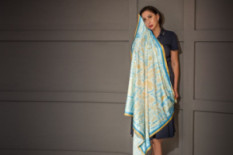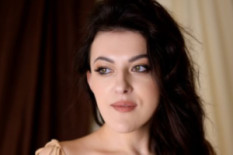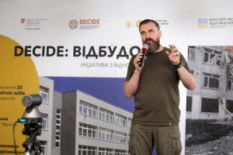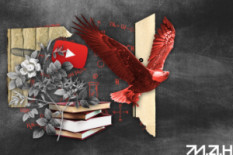The city of Melitopol was occupied in the early days of the war. It didn't suffer significant destruction like Mariupol or Bakhmut, but it, too, is deeply wounded. "There are not many ruins there?" - I ask at the beginning of the interview with Katerina. Her soul is still in Melitopol, even though we are conversing in a café in the center of Dnipro. "There aren't many ruins, but it's occupied," she looks at me with eyes full of suppressed pain. "People there are terrified."
Katya, her husband, first-grader son, and teenage daughter are safe. They try to live here and now, but in reality, they live there - in the beautiful, sunny, and cherry city of Melitopol.
Today's interview is the fourth out of six that we gathered thanks to the charitable foundation "DobroTUT"(GoodHERE) - a very unusual foundation that, as Katya says during our conversation, gives "moments" and strives with all its might to fill the lives of those who have suffered so many losses with joyful, inspiring experiences.
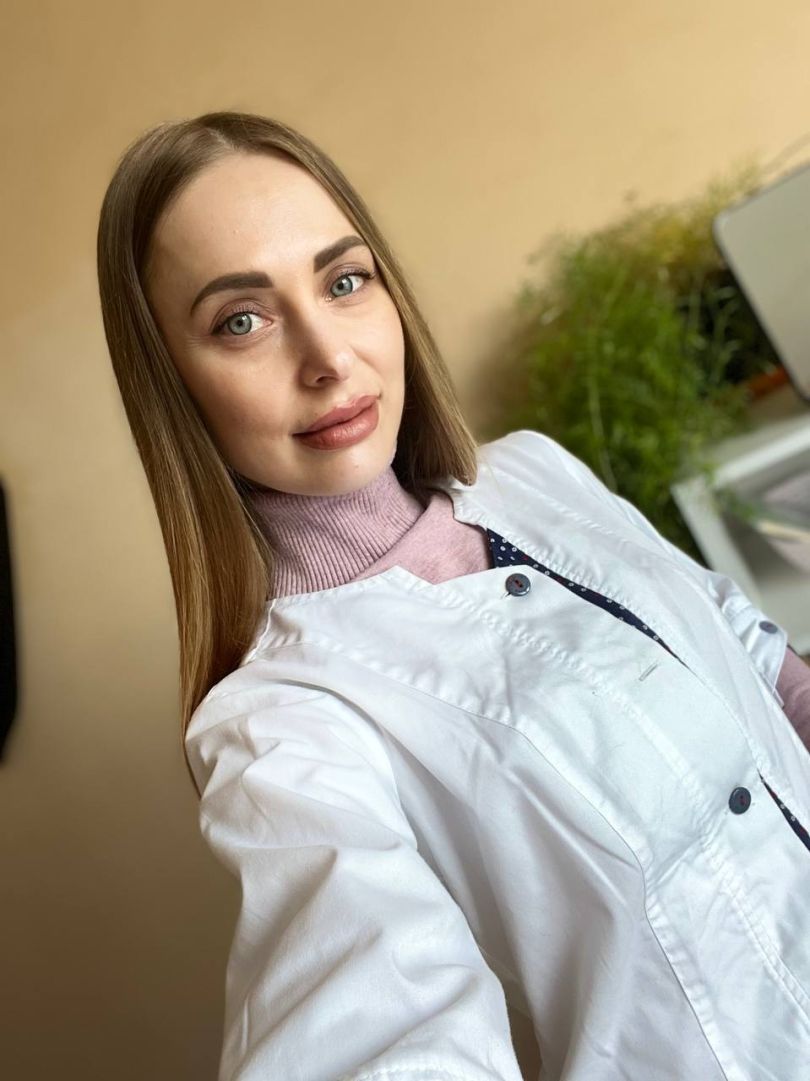
It all began with the interview of Lyudmila Pasheya, who has volunteered with the foundation since the early days after she fled Mariupol. Lyudmila's story launched our project.
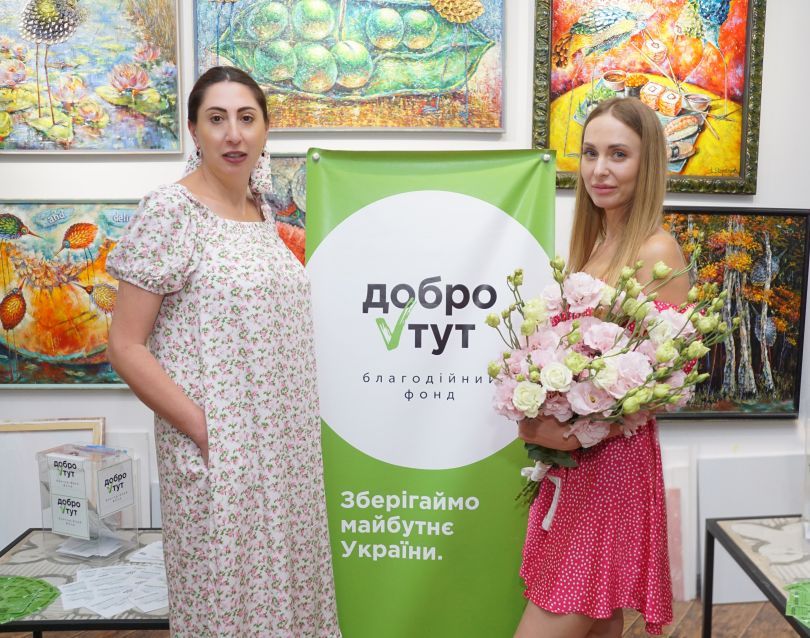
Every time I write these stories, I realize that words cannot convey everything I feel, hear, and see and everything the girls themselves think. It's a mixture of diverse, heterogeneous feelings, a combination of vulnerability and strength, all those losses that are invisibly present, and the desire to live here and now. But I don't stop trying to convey it all.
"Are you from Melitopol originally?"
My husband and I were born and raised there, building our life together. When we got married, we immediately laid the foundation for our house and spent ten years building it. Shortly before the war, we finally finished it. It was a big two-story house. We lived there for about eight months, and then the war intervened, and we had to leave everything and go.
"How did the full-scale war start for you?"
My husband told me it would happen in December, but I couldn't believe it. I was surprised - how could there be a war with Russia? They are friends. How is that possible? So, for me, it was a shock.
"But the war began in 2014..."
You don't worry about it when it doesn't concern you directly. Now I understand the people who live far from the front: they don't fully feel the war. And back then, even though it was very close in 2014, it somehow faded. You get used to it. You forget.
"How long were you in Melitopol since the beginning of the war?"
We came here, to Dnipro, on April 2nd last year.
How did you live during the occupation all this time?
The occupation began from the first days. They were standing near the city on the 24th of February at 10 p.m.. But at first, everything was calm. Honestly, we thought our city was simply surrendered without a fight. But thankfully, they didn't bomb us. And then, at 5 a.m. on the 25th, they started shelling the city. We spent two weeks hiding in the basement. Our house doesn't have one, but my parents live nearby. So, we were staying in their small basement. My sister-in-law, mother-in-law, father-in-law, husband, and I lived together there.
The absence of food complicated the situation. We weren't used to keeping supplies at home. You go and buy what you need, that's it. So, there was no food. But we had good neighbors. We supported each other a lot. One neighbor brought a broiler, and another brought milk and porridge...
People there are very friendly. And I'm a medic by profession. At that time, everyone who wasn't in critical condition was sent home from the hospital, so neighbors turned to me for help.
So, people paid you with food, it seems?
No, they didn't pay, they helped. Of course, they offered me money, but I said, "What are you talking about, money? There's a war going on. We should support each other."
In peacetime, I never took money from neighbors, but in such times, it's just nonsense. So, I ran from house to house under shelling, providing medical assistance.
Although, in reality, we were afraid to leave our house: tanks were stationed just 800 meters away. Tank battles even took place behind the yard. It turns out we were still lucky that everything remained intact.
What was the scariest thing?
We were very scared for the children. Our daughter experienced strong panic attacks. She cried so much she was shaking. She didn't want to leave the basement for a single moment. Even when we arrived in Dnipro, she slept in her clothes during the first days. She didn't believe that we were safe.
The active combat lasted two weeks there, and then they moved further. It became a bit easier in that sense, but occupation is still very scary. We hardly went to the city. Only for food. Previously, we never bought canned goods, sausages, or processed meats. But there, we just took everything: tasty or not. The main thing was not to be hungry.
But once, we did go to the city. It was precisely then that anti-occupation protests began. And they were shooting at people; several were wounded. The rest were forcefully dispersed; some were taken and driven far into the field. The girls were closer, the men further. They had to return on foot.
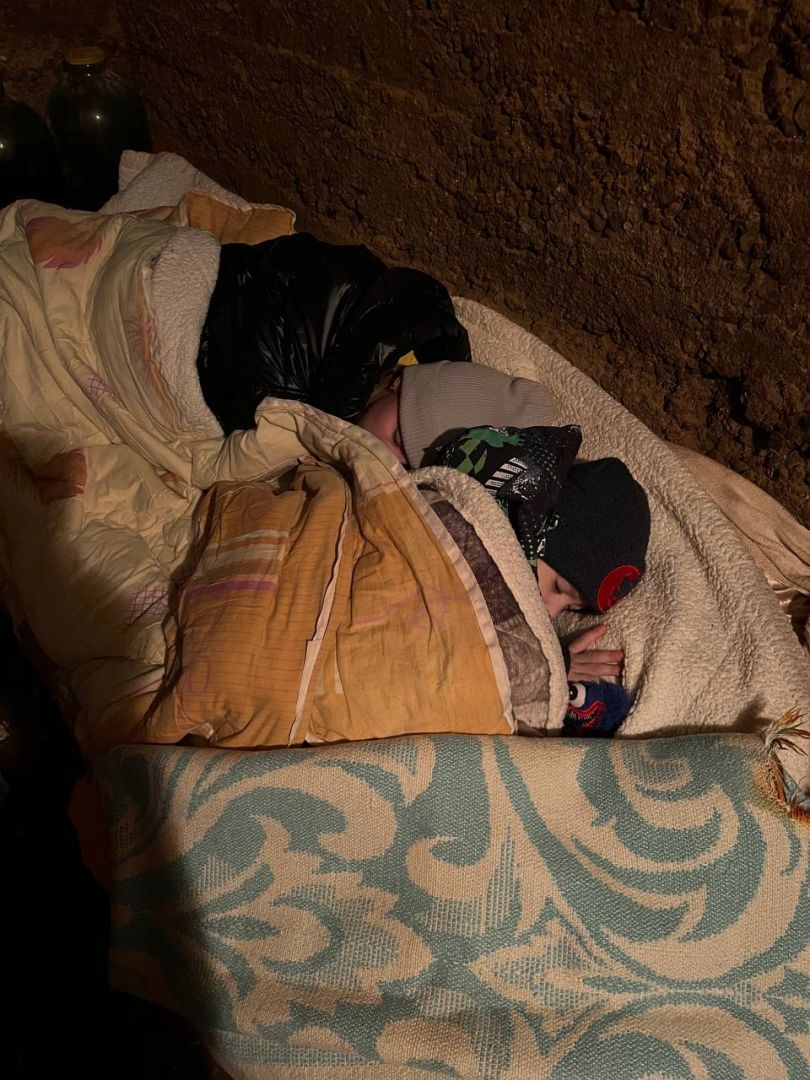
How did you manage to leave?
Leaving was very difficult. I told my husband we must leave when the first evacuation was announced. He knew there would be a war but hoped it wouldn't last long. He kept saying, "Two or three days." But I felt it would be much longer. However, we didn't go during the first evacuation; we decided to see how people would fare. Everyone knew that the columns from Mariupol were being shelled. But our people managed to reach it safely. After a week or two, they announced the second evacuation, and we decided to go this time. We chose Dnipro because it was closer to home, and wanted to return quickly.
At that time, there was no communication at all. We didn't know when the evacuation convoy would be formed. We gathered every day. My husband rode his bicycle to find out what was planned, and we prepared to join the convoy. But it was only on the third day that we managed to leave.
There were over 300 cars, six buses, two trucks, and one refrigerated truck. People with babies climbed into the trucks...
As we drove through the city, people cried. Those who stayed waved goodbye, and we cried too.
On the way to Vasilyivka, we encountered nine checkpoints; we were stopped at each one. When we arrived in Vasilyivka, there was already a long queue of hundreds of cars: people from Berdiansk, Mariupol - the entire south.
Buses and trucks were let through immediately, but we were left wondering what to expect.
Our cars were just 10 meters away from the checkpoint; there was a queue of 9 kilometers behind us, cars lined up in two rows.
In the evening, when it got dark, they told everyone to stay in their cars and not turn on headlights or use phones; they threatened to shoot. We couldn't move anywhere. Hundreds of vehicles with children, elderly people, and animals stood there, and everyone had to relieve themselves near their vehicles. We spent that night under the bombardment of "Grad" missiles.
I told the kids, "Stay calm; our people must know we are here. They won't shoot at us." But the orcs used us as a shield. Everyone knew that.
Our second car didn't take any food with them. They thought it would be like in peacetime: a couple of hours, and we'll be there. But I had been preparing for three days. We spent three days preparing and eating wherever we stopped when we tried to leave. Then we returned home, and I prepared again to take with us. By the way, they ate all of my food at the first checkpoint on the very first evening. The next day, my daughter-in-law and I went to the main checkpoint to ask them to let us through to Vasilyivka so we could buy something because the kids were hungry. They said if the bakery was open, they would let us through. Luckily, it was open. My daughter-in-law and I went, and APCs with soldiers passed us, shouting if we needed a ride. But we didn't tell our husbands that we went. We were terrified, thinking, "God, if something happens to us now... What can we do ourselves? Nothing."
We arrived at the bakery, and they were selling buckwheat bread. We took four big loaves and some pomegranate juice - that was all they had.
The orcs provided us with technical water and sometimes gave sweets and apples to the children. Oh, what "kind people."
At around noon, I suggested to everyone in the queue to go to the checkpoint and beg to be let through. There were children, including babies, who had to sleep in the cold car at night. The children were constantly crying.
I thought to ask them to let at least those with children go. So, one by one, we started collecting women. We met a woman in the line who knew the wife of our former mayor. She told us that they knew about us and that Irina Vereshchuk was already negotiating on our behalf.
We were worried they didn't know about us because there was no communication. But the woman said not to provoke them so they wouldn't become even angrier. Eventually, they negotiated for us. A convoy of the Red Cross came from Zaporizhia; they were supposed to be let through, and then us. And it happened; we finally managed to leave.
Then there were two more checkpoints - the 10th and 11th.
But at the next one, the shelling began. Everyone rushed out of their cars, but we couldn't go to the side of the road; it was all mined. That's how we stood on the side of the road. So frightening. You just stand there in the open, not knowing what to do...
Then it stopped, and we returned to our cars. But they continued the inspection.
They looked at us more critically than at the previous checkpoints. They forced my husband to take out all the bags from the trunk and checked them for a while. But eventually, they let us go.
After that was the gray zone, the bridge was blown up, so we had to bypass it through the wilderness. There were mines and exploded cars on the way; we saw all that. There were tanks blown up, our tanks... They probably left them there on purpose to show their power.
And then we saw our soldiers. Everyone was so happy, running out of their cars, ready to hug them, but the Russians began shelling the convoy.
So, they let you pass and then started shooting?
Yes, they let the convoy of about two thousand cars through and immediately started firing at it. Our soldiers told us, "Quick, get back in your cars and drive away!"
We drove very fast. I told the kids to duck in the back seat and cover their heads with their hands. They were crying a lot.
One car from the convoy got hit, and people jumped out while it was still moving - they survived. They were transferred to neighboring cars. One damaged car made it on its own.
The force of the explosion pushed our car. When we arrived in Zaporizhzhia, the police escorted us to the Epicenter, where everyone was being registered.
They asked if we had any contacts or needed any help.
We could have stayed there, but we were hurrying to get to Dnipro before curfew.
What were the strongest impressions when you reached the free territory?
Funny enough, we grabbed everything we saw when we entered the ATB (store). There was a shortage of goods in Dnipro, but for us, it was shocking - we hadn't seen this for so long.
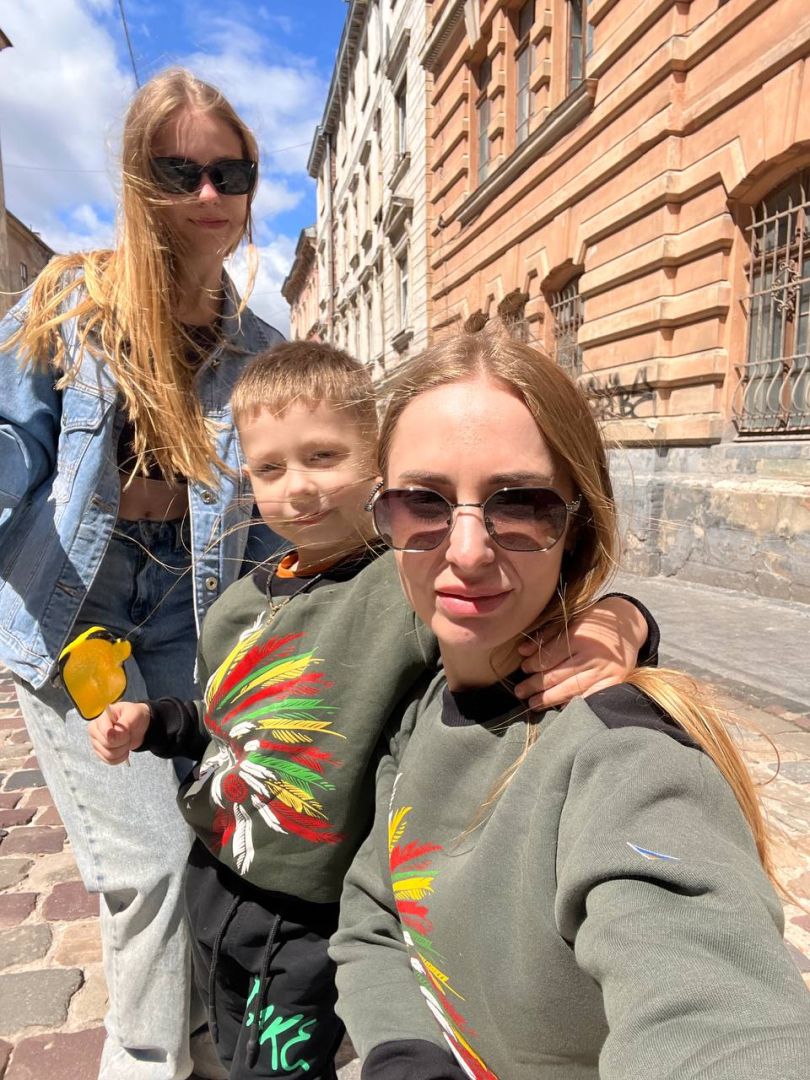
Where did you settle?
My husband has an acquaintance here; they used to cross paths at work. He let us stay in his house. We are very grateful to him - we lived there for three months free of charge. When we arrived, he eagerly awaited us and prepared borscht and potatoes. The fridge was filled with food. When we left, we bought a cake and coffee, and left the fridge full.
We are very, very grateful to him.
What were the prevailing emotions at that time?
Euphoria from being free! Not having to look around constantly, not controlling your phone.
At home, you always delete something and check everything. But here, you can do everything without any fear. It was such a joy.
But in the summer, I was hit by severe depression. I was crying all the time and couldn't sleep at all. I wanted to go home so much. The doctors prescribed strong sedatives for me.
Here, I got a job at the hospital. I am a cosmetologist; I had my own office in Melitopol. But now, there is a great need for medical personnel, so I started working in a medical institution.
I wanted to go home for a few days, but in August, a peaceful column was hit in the Zaporizhzhia region, and many people died, including children. This news completely devastated me.
And I decided not to go. Then they stopped letting anyone in or out.
How did you cope? Did it get a little easier?
It did, but still... Home is home.

How is your life here?
My husband works, and my son is getting ready for school; he will start first grade. Our daughter is a sportswoman; she has been doing artistic gymnastics since she was four. She has been in sports for ten years and continued training after we arrived. She even represented our Melitopol at competitions here. We are living our lives.
But we all needed therapy. My younger son, even though he perceived those events as a game, became very irritable, uncontrollable and started bedwetting at night. We had to seek help from a neurologist and go to a psychologist. Our daughter also went to a psychologist. Fortunately, there are many charitable foundations here where specialists provide free help to children.
But for me, the "GoodHere" charitable foundation probably helped the most.
.jpg)
How did you find the art project?
I applied to participate in the art project, and when I attended the first meeting in January, I immersed myself entirely in painting. For a few hours, my brain just shut off. It felt so good.
And there are such people there... Lyudmyla is like a caring mother hen to all of us. She protects and unites us.
We found friends there because we lacked communication so much. Thanks to the foundation, we can distract ourselves a bit from what we went through.
And we still go through it…
Yes, we still go through it. It just doesn't let go.
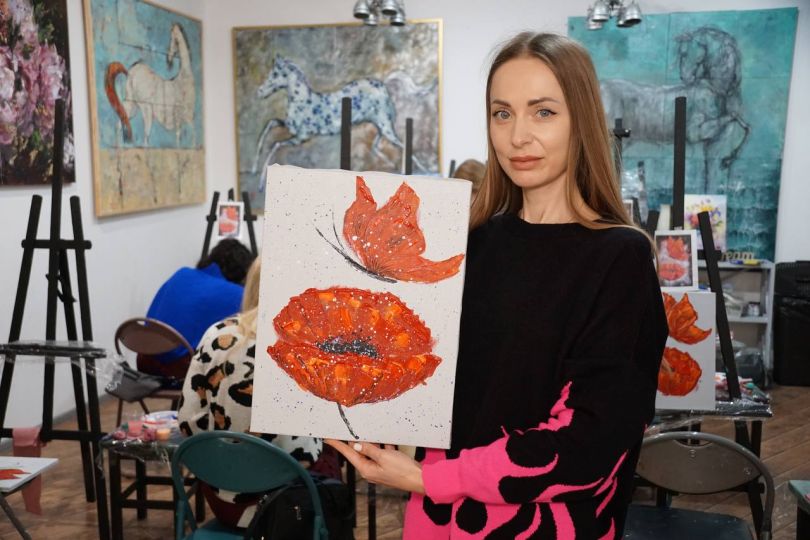
What did you paint?
A poppy. It was my first painting. Then we had a special project for the Day of the Coat of Arms.
As a group, we painted a joint picture to later put it up for auction. At first, we didn't even know what we were painting because we painted fragments. Then we assembled the puzzle. It turned out very nicely.
We also enjoy events at the opera. "GoodHere" has so many interesting activities. They do so much! Even more, than they can. I don't even know how to describe it. It's like a big family you can turn to, and they will always help you. When there's a circle of communication and important matters, you get less fixated on the negative and read the news less.
Recently, the foundation celebrated its anniversary. They organized a large-scale event. My kids were thrilled. I volunteered there, registering people for a lottery. The atmosphere was fantastic. Many different workshops were organized for children. They made caramel and painted gingerbread cookies. There was face painting, and they even had ice cream. I hardly saw the children; they came, told me something, and ran off again. The area was secured, and there were many people, but everything was wonderfully safe.

There is also a very lovely initiative called "Letter of Kindness." It's great to be able to thank someone who once supported you. We wrote a letter to the man who sheltered us. It's not our turn yet, but we also want to thank the charitable foundation where that wonderful child psychologist worked, the one who helped both my son and daughter.
Besides, our daughter Polina completed the "Media Academy" program from the foundation. She loved it there. Now she's considering whether to continue her athletic career in adulthood or go into media. And thanks to this project, she was offered to study as a model. She became interested and will attend the classes. "GoodHere" gave her the push.
What do you most remember from the time you lived in Melitopol?
Family, home, and hugs from loved ones.
We read forecasts, waiting for the city to be liberated, always waiting. Maybe we should just live without waiting. But it doesn't work out. You wait and wait.
Perhaps it's easier for those who have lost everything: they have nowhere to return. But hope keeps us going. It hinders starting a new life.

I can imagine what your dearest dream is.
Victory and returning home are the dearest dreams. But there are many traitors there who rejoice in all of this. And who knows who has come to the city? Families have come and occupied someone else's homes. Traitors say they are living very well. And our people disappear, hiding in basements.
What is your biggest insight during these times?
You must live in the present, not the future, because the future may not come.
Do you embody it?
Well, yes.
Are you trying to live?
Yes. But I think we have a chance that everything will be fine if we have a home and our relatives are alive.
But it turns out that you live a bit in the past and the future...
The past doesn't let go.
Perhaps it shouldn't. It's your experience, and you just need to integrate it.
Previously, when our grandmothers told us about the war they went through, we didn't really understand it... but now it caught up with us too. For them, it was their pain; for us, it's ours. We just have more understanding now. And maybe when we tell our great-grandchildren, they won't understand everything as we once didn't. But we really want to pass on this experience so that they don't befriend those. With them. So that they don't want to befriend them.
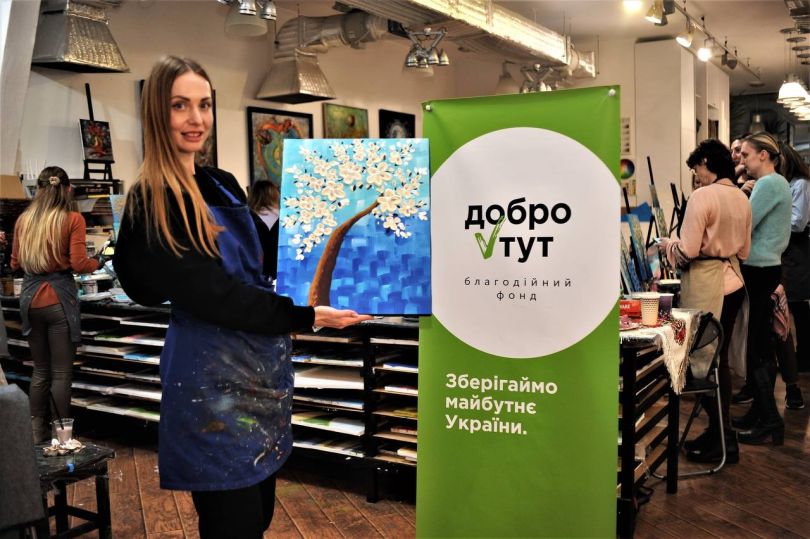
But life here has improved a bit, hasn't it?
Yes. But I don't work; I've cared for the children since my husband found a job. I became a housewife. It's not like me. It's hard for me to be in this role. That's why if there's an event by "GoodHere," I always go.
What is the most important thing for you in it?
This foundation gives moments. And moments are more valuable than things. What will we cherish and remember? Food? No, we will not forget bright moments; we lack them in our lives now. So, I collect them. And in general, as Lyudmyla says, a happy mother means a happy family.
That's what the art project where you painted is called...
Yes. And this motto is correct. I'll go to an event, fill myself with emotions, come home, and fill my family with them. It always works like that.
And overall, I want to say that when I met Lyudmyla, from the first moment, it felt like she had known me all my life for years. She's so uplifting and energizing for everyone. And she's from Mariupol too. She's like us—she understands everything.
When we interviewed Lyudmyla, she said, "I don't know if I need 'GoodHere,' but 'GoodHere' needs me."
Yes. We all need "GoodHere." Very much. It's phenomenal. There's nothing like it anywhere.
I only regret that I met all of them so late. I missed so much.
So now I try not to miss anything. Because "GoodHere."
